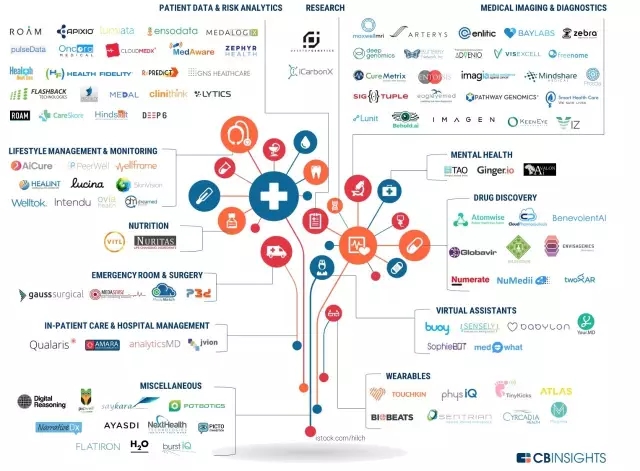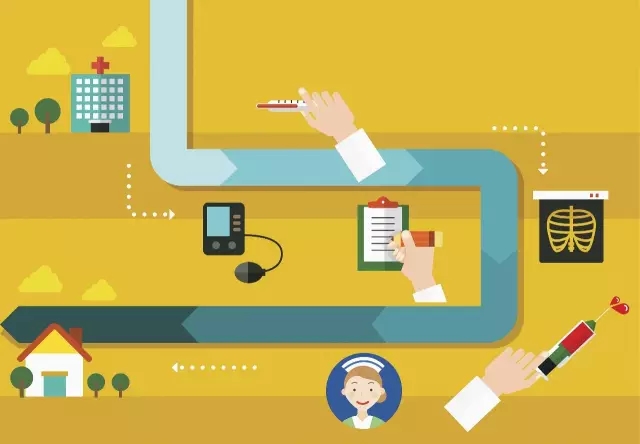Google and IBM Watson are doing the same thing: new trends in artificial intelligence care are here.
The days of distinguishing a startup from other companies with artificial intelligence (AI) are over. Today, if a technology company doesn't use some machine learning technology, it's hard to attract venture capital or find a partner. However, for companies trying to use AI for healthcare innovation, the risks they face are still high. In the medical industry, the wrong algorithm means the difference between life and death, so the hype around popular technology will be more severely tested here than other industries. In the past five years, the number of digital medical companies using artificial intelligence in the United States has increased dramatically. In 2017, CB Insights tracked more than 100 AI-focused healthcare companies and noted that since January 2015, 50 of them have completed their first round of external financing. Financing events in this area have grown from less than 20 in 2012 to nearly 70 in 2016. The applications of these companies' AI technologies in the medical field include imaging diagnostics, remote patient monitoring, drug development, and oncology research. Some major AI technology companies, like Ayasdi (which once built a machine intelligence platform based on topological data analysis), and many emerging AI companies, such as H2O and Digital Reasoning Systems, are all involved in the medical field. The field has also attracted the attention of top venture capital firms including Khosla Ventures and Data Collective. 106 emerging AI technology companies in the healthcare sector (Source: CB Insights) A recent survey also found that more than half of hospitals plan to introduce artificial intelligence within five years, of which 35% plan to achieve this goal within two years. In Boston, Partners HealthCare has just announced a ten-year partnership with GE Healthcare to integrate deep learning technology into its network. The application of AI will not only be limited to improving the clinician's workflow and handling user feedback faster. American doctors surveyed at the hospital believe that AI technology may have the greatest impact on population health, clinical decision support, diagnostic tools, and precision medicine. In addition, AI can help drug development, clinical trials, etc. become faster, cheaper and more accurate. How do we achieve our goals? But the American media pointed out that the era of putting all the philosophies into AI has not yet arrived. Andrew Maas, chief scientist and co-founder of Roam Analytics, said: "The future of the human brain is very powerful." "The ability to evaluate computers is powerful, but its level is not enough to gain our trust." So, when can we see the medical industry transforming through machine learning? Recently, we have seen this technology in the simplest applications and the most complex diagnostic tasks. It can be used in the form of natural language processing or image recognition, and can be processed with powerful algorithms for decades. A database of medical research accumulations. However, AI cannot successfully enter the medical field if it cannot overcome a series of additional challenges, such as regulatory barriers, compatibility with traditional hospital IT systems, and strict restrictions on access to critical medical data. However, caution does not mean that people should stop innovating. Digital health stakeholders realize that they want to fully exploit the true potential of AI. They also need strategic partners and a clear understanding of statistics. Despite the many challenges, innovative companies have not dared to neglect in the field of medical AI. For example, Google recently announced that it has introduced its experimental and real-user testing of machine learning capabilities into the medical field. The company's research team, Google Brain, together with the University of California, San Francisco, and Stanford, collects medical data from millions of patients who have lost their identity. Not only that, Google CEO Sandal. Sundar Pichai said at the Google I /O Developer Forum this month that in 2016 Google launched the Tensor Computing Center and described it as an AI-based big data center. Hand Soap Liquid,Hand Foam Soap,Wash Hand Soap,Soap Hand Wash Wuxi Keni Daily Cosmetics Co.,Ltd , https://www.kenidailycosmetics.com
